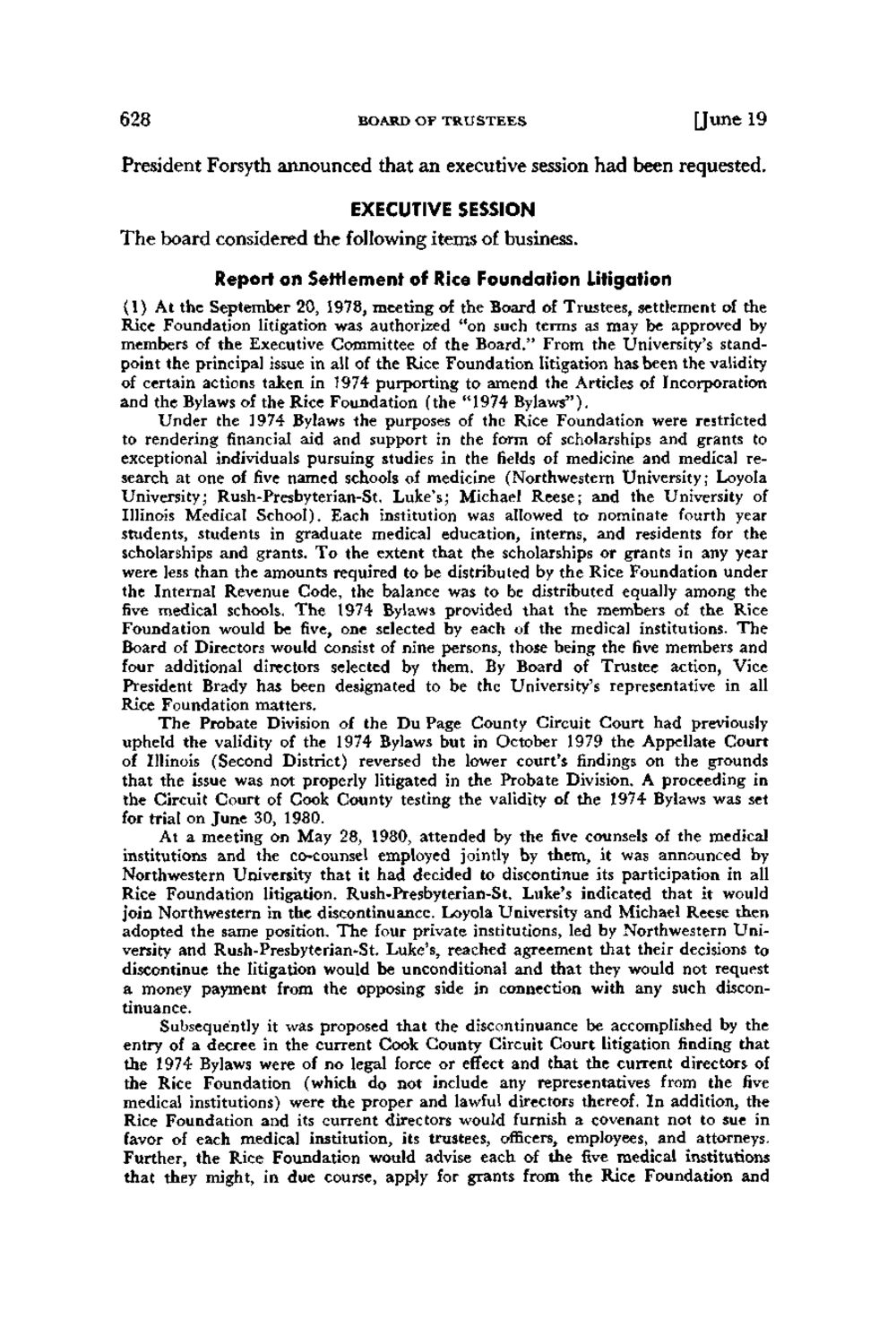| |
| |
Caption: Board of Trustees Minutes - 1980
This is a reduced-resolution page image for fast online browsing.

EXTRACTED TEXT FROM PAGE:
628 BOARD OF T R U S T E E S [June 19 President Forsyth announced that an executive session had been requested. EXECUTIVE SESSION The board considered the following items of business. Report on Settlement of Rice Foundation Litigation (1) At the September 20, 1978, meeting of the Board of Trustees, settlement of the Rice Foundation litigation was authorized "on such terms as may be approved by members of the Executive Committee of the Board." From the University's standpoint the principal issue in all of the Rice Foundation litigation has been the validity of certain actions taken in 1974 purporting to amend the Articles of Incorporation and the Bylaws of the Rice Foundation (the "1974 Bylaws"). Under the 1974 Bylaws the purposes of the Rice Foundation were restricted to rendering financial aid and support in the form of scholarships and grants to exceptional individuals pursuing studies in the fields of medicine and medical research at one of five named schools of medicine (Northwestern University; Loyola University; Rush-Presbyterian-St. Luke's; Michael Reese; and the University of Illinois Medical School). Each institution was allowed to nominate fourth year students, students in graduate medical education, interns, and residents for the scholarships and grants. T o the extent that the scholarships or grants in any year were less than the amounts required to be distributed by the Rice Foundation under the Internal Revenue Code, the balance was to be distributed equally among the five medical schools. T h e 1974 Bylaws provided that the members of the Rice Foundation would be five, one selected by each of the medical institutions. The Board of Directors would consist of nine persons, those being the five members and four additional directors selected by them. By Board of Trustee action, Vice President Brady has been designated to be the University's representative in all Rice Foundation matters. T h e Probate Division of the Du Page County Circuit Court had previously upheld the validity of the 1974 Bylaws but in October 1979 the Appellate Court of Illinois (Second District) reversed the lower court's findings on the grounds that the issue was not properly litigated in the Probate Division. A proceeding in the Circuit Court of Cook County testing the validity of the 1974 Bylaws was set for trial on June 30, 1980. At a meeting on May 28, 1980, attended by the five counsels of the medical institutions and the co-counsel employed jointly by them, it was announced by Northwestern University that it had decided to discontinue its participation in all Rice Foundation litigation. Rush-Presbyterian-St. Luke's indicated that it would join Northwestern in the discontinuance. Loyola University and Michael Reese then adopted the same position. T h e four private institutions, led by Northwestern University and Rush-Presbyterian-St. Luke's, reached agreement that their decisions to discontinue the litigation would be unconditional and that they would not request a money payment from the opposing side in connection with any such discontinuance. Subsequently it was proposed that the discontinuance be accomplished by the entry of a decree in the current Cook County Circuit Court litigation finding that the 1974 Bylaws were of no legal force or effect and that the current directors of the Rice Foundation (which do not include any representatives from the five medical institutions) were the proper and lawful directors thereof. In addition, the Rice Foundation and its current directors would furnish a covenant not to sue in favor of each medical institution, its trustees, officers, employees, and attorneys. Further, the Rice Foundation would advise each of the five medical institutions that they might, in due course, apply for grants from the Rice Foundation and
| |